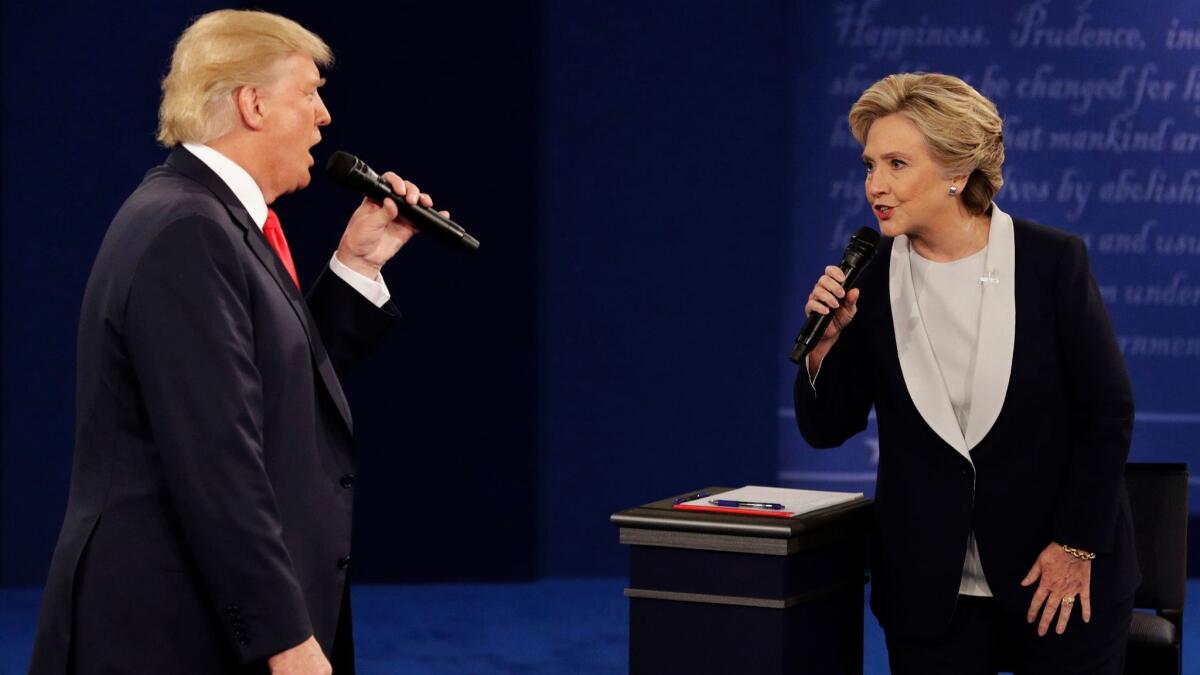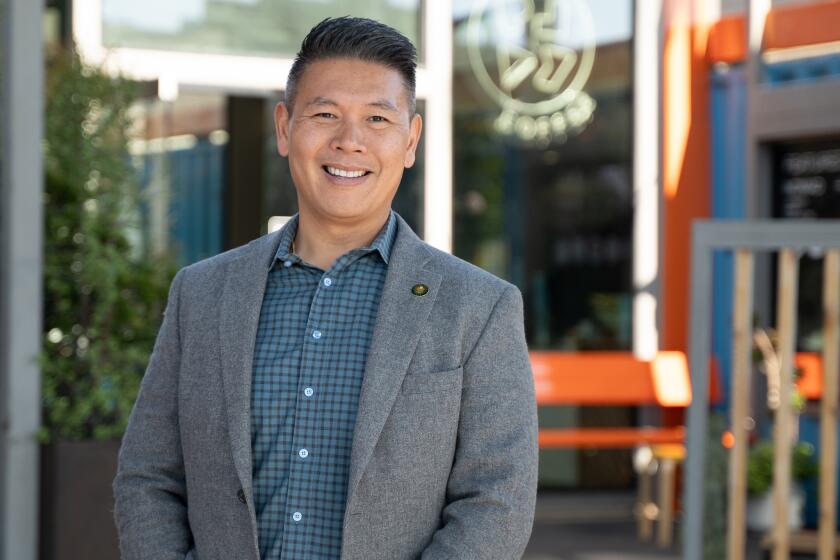Op-Ed: Should you pick a fight with your relatives over the election?

In the final days of such a long and nasty election, it seems quaint to recall a time when relatives showed their disagreement by planting rival campaign signs in the front lawn. We’re not at Civil War “brother against brother” levels of discord, but “niece against uncle” is a fairly accurate description of some family dinners in 2016.
As for me, like many people whose political views are opposed to those of their loved ones, I’ve long taken a live-and-let-live approach. Silence is how I keep the peace.
For the record:
11:38 a.m. Sept. 22, 2024This article initially attributed research published in the American Journal of Political Science to Melissa Heeke. Heeke discussed the research in a blog post, but it is not original to her.
But this presidential campaign has raised the stakes. I find Donald Trump’s particular brand of politics so toxic that the choice not to challenge relatives who support him has begun to seem irresponsible — the equivalent to tacitly endorsing racism, sexism and xenophobia. I’ve started to wonder whether I have an obligation — in this election and beyond — to try to change the minds of friends, family and colleagues who disagree with me ideologically.
Of course I’m not at all convinced that I can change their minds. Certainly they’re not going to change mine.
Research going back to the 1940s shows that friends and family, not news anchors or strangers on Twitter, have the greatest influence on how a person votes.
“I hope all of my good white friends who regularly fact-check Trump on here are also talking to their families back home in the same way,” BuzzFeed editor Saeed Jones tweeted recently.
What a fantasy, I thought. A rational conversation with them is simply not possible! I have no illusions about the political efficacy of shouting into the void of social media, but it is surely more productive than trying to connect with someone like my grandfather, who’s been on a steady media diet of Fox News for decades.
Political scientists would tell me I’m wrong. Research going back to the 1940s shows that friends and family, not news anchors or strangers on Twitter, have the greatest influence on how a person votes. “Voting is a social activity,” Melissa Heeke wrote in a blog post about research published in the American Journal of Political Science. People in households where there is partisan disagreement tend to show up to vote in higher numbers.
I wonder, though: Are those voters turning out because they’ve been persuaded, or to cancel out each other’s votes? My guess is the latter.
According to the Pew Research Center, 74% of Democrats and 84% of Republicans say they have at least a few close friends in the other camp. Though some people say they enjoy political banter across party lines, 61% say they end up realizing they have less in common with their friends than they previously thought. Conversation may do more to highlight gaps than bridge them.
At least I’m not the only person struggling to decide how vociferously to oppose my loved ones. I talked to a few voters like me — young, white, liberal women — who are figuring out how to engage their more conservative relatives in political conversation.
Annie Howard decided to speak to her Trump-supporting parents because “in light of all of the new allegations and videos and sound bites I can’t help but feel that their vote for him is them saying that sexual assault is fine.” Yet she’s not optimistic about her ability to sway them. “Like, yes, I am trying to convince you to not vote for this disgusting human,” she says. “But I need to figure out how to do it in a nuanced and loving way.”
Kaitlyn Hood tries to steer conversations with her Republican-voting mother away from big-picture ideological issues and back to policies. “Obviously, I want her to have a change of heart and stop being Islamophobic and homophobic, at the least,” she says. “But realistically, I realize that’s not likely to happen, and I can’t force it to happen.” Instead, “I’ve sent my parents articles on healthcare and science funding, which impact me.”
Others have turned to threats. This summer, the New York Times interviewed Trump-supporting men who were married to Trump-opposing women. “If you vote for Trump, I will divorce you and move to Canada,” one wife told her husband.
Most of us don’t have this debate in the pages of a national newspaper. Instead we have to decide whether to politicize interactions that might not start out as confrontational. We must decide whether to comment on mom’s Facebook tirade against Hillary Clinton, or whether a birthday brunch is the right moment to ask Dad why he believes that Mexico will pay to build a border wall.
Ultimately the fever pitch of a presidential campaign probably isn’t the best time for a chat. Maybe it’s more effective to talk things over when the stakes are lower. But I’m not advocating reserve, exactly — just patience. And faith in the bonds of friendship and family. It may not be possible to change hearts and minds, but a few difficult conversations about politics shouldn’t tear us apart.
Ann Friedman is a contributing writer to Opinion. She lives in Los Angeles.
Follow the Opinion section on Twitter @latimesopinion and Facebook
More to Read
A cure for the common opinion
Get thought-provoking perspectives with our weekly newsletter.
You may occasionally receive promotional content from the Los Angeles Times.










